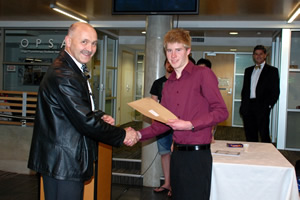Early Learning in Medicine, Year Two
Blake Henley
 |
| Class of 1979 Undergraduate Medical Scholarship recipient Blake Henley receiving his award from Professor Mike Hunter. |
Year two of medical studies has been full of amazing experiences as well as many academic, social and personal challenges. The year has been split into five 'block' modules; behavioural medicine, the musculoskeletal, cardiovascular, respiratory and gastrointestinal systems. Each module was very different from the last, not just in content but the way in which it was taught and challenges that they bought.
Coming from a largely science background the first module was unlike anything I had studied previously. Behavioural medicine veered away from anatomy and physiology and introduced us to an array of psychological conditions that are largely unexplained. I took away from this module; definitions of many different disorders as well as a new appreciation for the prevalence of and debilitation caused by mental illness. While doing the behavioural medicine module we were introduced to three tutorial programs, Clinical Skills, Healthcare in the Community and Integrated Cases. Clinical skills focused on providing us with the tools to carry out successful consultations with patients, from communication to practical examination skills. Healthcare in the Community focused on just that, the application of health care in a wider setting. The program also encouraged us to consider a patient as more than the disease they present with and to appreciate and incorporate their social, emotional and spiritual aspects. Learning these types of skills and ideas so early on in medical training came initially as a surprise, but now with an appreciation of their importance, I think they came at a perfect time.
Studying the musculoskeletal system for me was less challenging. I enjoyed learning the names and movements carried out by the main muscles of the upper and lower limb. Part of the laboratory work in this module was carried out with human cadavers. Initially the thought of dissecting a human was very frightening. I had only seen bodies in the funeral parlour where they looked peaceful and dressed in their Sunday best. As expected the experience in the lab was very different. The bodies are stark naked on a cold stainless steel table; it is obvious they are there for one purpose only. As frightening and morally challenging as the process appeared, when dissection began it soon became clear how valuable the experience was and how privileged we were to have access to such a resource. Looking back at this particular experience it taught me so much about myself as well as the anatomy.
The next two modules in the series were the cardiovascular and respiratory systems. I enjoyed these two the most. They complemented each other in content and the style in which they were taught. It was interesting to learn the pathogenesis and aetiology of cardiovascular diseases that are becoming more and more prevalent. Around this time we were set free to interact with 'real' people and were given a shift at one of the rest homes around Dunedin. I was assigned to Ross Home, Dunrowan Hospital unit for 20 hours of ward time. For me, this has been the highlight of the year. It would have been too easy to become overwhelmed by the reality of old age but I was able to enjoy many of the residents personalities, sense of humors, their stories and wisdom and I felt like I was really helping. I accredit to this placement a stronger confidence in my abilities, improved interpersonal skills and experience dealing with difficult situations.
By the time the gastrointestinal module came along I was looking forward to the end of the year and thinking about exams. However, it was made clear that there was no time to relax just yet. By the end of the first lecture I learnt what a giant topic it was to become. The anatomy seemed more complex and the physiology was in a league of its own. Getting through this module while finding time to study for exams and finish last minute assignments was tough. Although, when exams came around I felt ready. I feel the OSCE and OSPE (Observed Structured Clinical and Physical Examinations) were my strongest. They are held in a practical manner testing our consultation, physical examination and anatomy skills. The three theory examinations tested us on the content we learnt throughout the whole year and I left each one feeling confident.
It's hard to believe that year two is over. It seems only yesterday that I received the email of acceptance into medicine, yet so much has happened since then. I would like to take this opportunity to thank the class of 1979 for gifting this scholarship to me. I am extremely grateful for the financial assistance which will go towards helping me complete my degree. |

